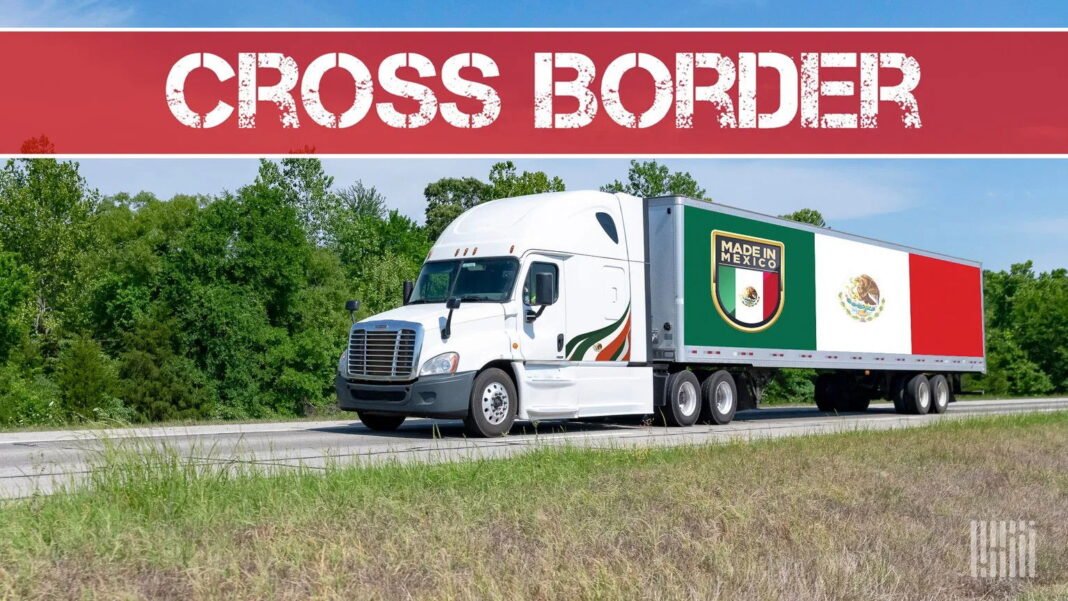Borderlands is a weekly rundown of developments in the world of United States-Mexico cross-border trucking and trade. This week: Winner in global tariff war could be Mexico, report says; DutyFreeZone.com secures distribution rights for Corona beer; and Korean auto supplier opens factory in Mexico.
Mexico could reap the benefits of President Donald Trump’s global tariff war and is poised to continue profiting from the growing trend of nearshoring.
While the average U.S. tariff rate rose to as high as 28% on countries around the world after Trump’s “Liberation Day” import tax announcement on April 2, most goods from Mexico to the U.S. qualify for tariff-free treatment under the United States-Mexico-Canada Agreement.
The USMCA “positions Mexico as a reliable alternative for companies seeking to reduce exposure to trade friction and long lead times from overseas markets,” according to Uber Freight’s 2025 Q2 Market Update.
“Nearshoring .. might slow down a little bit, but it is not going away,” Jose Guerrero, Uber Freight’s director of U.S. customs, told FreightWaves in an interview. “As a matter of fact, there’s a lot of Chinese investment in Mexico that’s happening. Our sales teams are really engaged with those companies.”
Nearshoring involves relocating business operations, particularly manufacturing and production, from countries around the globe to Mexico, which is geographically closer to the U.S.
The shift in supply chain strategy aims to benefit from Mexico’s trade agreement with the U.S. and other nations, along with the country’s lower labor costs and streamlined supply chains across North American markets.
Tariffs on goods imported from China to the U.S. vary significantly depending on the product, with rates ranging from 0% to 145%, according to the Peterson Institute for International Economics. The average tariff rate on Chinese exports to the US is currently around 51.1%,
Mexico was the top trading partner of the U.S. in April, with two-way commerce totaling $69.7 billion, a 4% year-over-year decline compared to April 2024.
Canada ranked No. 2 in trade at $56.6 billion in April. China ranked third at $33.6 billion, followed by Germany at $20.5 billion and Japan at $20.4 billion.
“Mexico and Canada are the biggest trading partners with the U.S., and with some of the changes that have transpired over the last couple of months … Those companies that are really taking advantage of the whole USMCA program have really not stopped, trade never stops,” Guerrero said.
“The volume continues to be there. I think customers are starting to realize that maybe this might be the new norm. There are some customers who are a little hesitant because obviously tariffs can impact bottom lines. But at the end of the day, they have orders to fulfill, and consumers are still buying, so the demand is still there.”
Guerrero said customers have been seeking solutions to lessen the impact of import tariffs on supply chains.
“What our customers are saying is that they’re trying to be smarter … “How can I mitigate my risk or mitigate my tariff outlay or duty outlays,” Guerrero said. “They’re not looking to avoid it, because avoidance is never a way. Tariffs are put in place, and they’re going to be in place until legislation changes it.”
Shippers are closely examining their entire supply chain in search of cost-saving opportunities, according to Guerrero.
“More customers are starting to ask the right questions,” Guerrero explained. “‘Where are my components made? Where are they sourced from? How does that affect my overall costs—or even the duties I pay on certain goods?’”
Guerrero’s top advice for shippers is to “know your data, stay current on regulations and costs change daily. And most importantly, talk to your customs brokers and service providers. We have the insights and updates you need to stay ahead.”
Laredo, Texas-based DutyFreeZone.com recently signed an exclusive distribution agreement with Corona beer.
The strategic alliance grants DutyFreeZone.com the right to distribute Corona across select duty-free zones, emerging markets and special international territories, according to a news release.
As part of the agreement, DutyFreeZone.com will handle the importation, warehousing, and distribution of Corona products — including bottles, cans and multi-packs — across its network of authorized retailers, hospitality operators, and wholesalers in international markets
Founded in 1998, DutyFreeZone.com is an online marketplace that allows customers to purchase duty-free products from thousands of vendors worldwide. The company operates logistics centers in Panama, Curaçao, Mexico and the U.S.
Corona beer is owned by AB InBev. Constellation Brands holds the exclusive rights to import, market, and sell Corona in the U.S.
Korean auto supplier opens factory in Mexico
Korean automotive company SL MEX announced the completion of a $45 million production plant in Villa de Reyes, Mexico, according to Cluster Industrial.
The 150,695-square-foot factory will produce automotive headlamp modules for global clients such as BMW, General Motors, Hyundai and Kia. The facility currently employs 385 workers.
Villa de Reyes is a municipality in the Mexican state of San Luis Potosi in central Mexico.
SL MEX is the Mexico-based subsidiary of SL Corp., a global automotive supplier based in Daegu, South Korea. The company was founded in 1954 and has 12 factories around the world. SL Corp. employs more than 12,000 workers.


